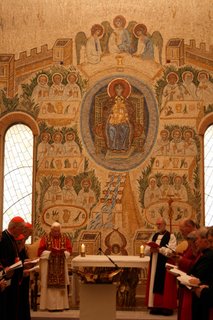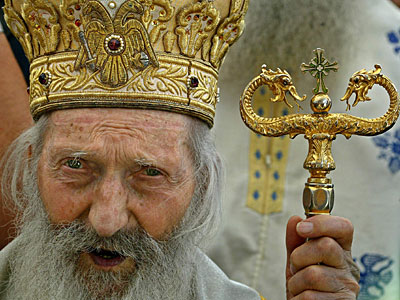Below is Bishop Griswold's letter in response to (1) the Camp Allen Letter, and (2) The Kigali Communiqué . +Griswold still seems not to understand the issues as articulated by the bishops at Camp Allen, or the Primates at Kigali. That he still doesn't get it just further illuminates (if further illumination were necessary) the fact that our divisions are no longer bridgeable. We cannot work this out among ourselves. God can work it out, surely. But if ECUSA insists on yoking herself to the dissenting American dioceses while God is working these issues out in his own way and time, then ECUSA will have chosen to annihilate the dissenters. And how is that love? I will repeat here what I said to +San Diego (as though he or Griswold read this blog): For the love of God, let us go in peace.Here is the letter, with certain bits highlighted and commented upon by me:My dear brothers and sisters:
We have all received within the last days a letter from the bishops who gathered at Camp Allen at the invitation of Don Wimberly. As well, you may have seen an unsigned communiqué sent from a gathering of primates and others from the global south which was held in Rwanda. Let me share some reflections about these two meetings with you.
With regard to the gathering in Texas, advance and follow-up information about this meeting suggest an involvement by the Archbishop of Canterbury. It is important for you to know that the Texas meeting was in no way held at the Archbishop’s initiative nor was it planned in collaboration with him. The two bishops from the Church of England did not attend as delegates of the Archbishop, nor were they empowered to speak on his behalf except to give the message that “the bishops meeting are bishops of the Catholic Church in the Anglican Communion.” The Archbishop has always encouraged exchanges of views, as have I. Therefore, I appreciate the concern of those who attended the Texas meeting for the faithfulness of our church. At the same time, such encouragement does not necessarily imply affirmation of or agreement with points of view expressed in the course of such exchanges.
I would like to observe here that our House contains many points of view held by persons of unquestionable faith whose desire is to be faithful to the mind and mission of Christ. Because of this, I have seen during these nine years how unhelpful it can be for us as a community when we separate ourselves from one another by signing, or not signing, statements. As we have learned, position statements can easily occlude the more subtle dimensions of agreement and disagreement, which is where our deepest engagement with one another can occur. As much as we draw comfort from those who share our own point of view, it is important for us on all sides to realize that
truth in its fullness cannot be contained in any one perspective.
[YES IT CAN. AND IT IS. THE
SPECIES AETERNI, THE DIVINE PERSPECTIVE. AND OUR PATHWAY TO THAT PERSPECTIVE WAS LAID DOWN, MARKED, AND ILLUMINATED FOR US BY CHRIST. IT IS WHAT WE CALL THE ‘APOSTOLIC TEACHING.’ IT IS WHAT CHRIST HANDED ON TO HIS APOSTLES, AND WHAT THEY HANDED ON (TO HAND ON =
TRADERE, THAT WHICH IS HANDED ON =
TRADITIO = TRADITION) TO THEIR SUCCESSORS. IT IS THE PATRIMONY OF CATHOLICITY – INCLUDING ANGLICAN CATHOLICITY – AND IT IS THAT TO WHICH ECUSA HAS REFUSED TO CONFORM.]
The fact that some among us feel we did not go far enough in responding to the invitations of the Windsor Report while others feel we have gone too far is to be expected in a church in which people hold differing theological perspectives. We are making our best efforts within our church to be faithful to the Windsor process, and I am gratified by how we, for the most part, are comporting ourselves as brothers and sisters in Christ.
The letter from Texas said it is the clear sense of the signers that “the General Convention of 2006 did not adequately respond to the request made of the Episcopal Church by the Communion through the Windsor Report and the Primates at Dromantine.” It says that this view is “consistent with the Archbishop of Canterbury’s Holy Cross Day letter to the Primates.” Given the very nuanced and cautious way in which the Archbishop expresses himself, I think it is important here to refer back to that letter and what Rowan actually said, and I quote: “It is also clear that the Episcopal Church has taken very seriously the recommendations of the Windsor Report; but the resolutions of General Convention still represent what can only be called a mixed response to the Dromantine requests. The advisory group has spent much time in examining these resolutions in great detail, and its sense is that although some aspects of these requests have been fully dealt with, there remain some that have not.”
I note here that Archbishop Robin Eames, Chairman of the Lambeth Commission which produced the Windsor Report, says in his introduction: “This report is not a judgment. It is part of a process. It is part of a pilgrimage toward healing and reconciliation.” As such, I believe the “Windsor process” is a process of mutual growth which calls for patience, mutual understanding and generosity of spirit rather than stark submission.
It also needs to be said that the assessment of the responses of the Episcopal Church to the Windsor process is
not the responsibility of self-chosen groups within the Communion. At the April 2006 meeting of the Joint Standing Committee of the primates and the
Anglican Consultative Council a small working group drawn from different parts of the Communion was identified to consider the actions and decisions of our General Convention. They will communicate to both the Joint Standing Committee and then the Primates Meeting in February. The Archbishop has repeatedly underscored the need to allow this process to unfold.
[SO ASSESSING THE ECUSA RESPONSE IS NOT THE RESPONSIBILITY OF SELF-CHOSEN GROUPS, BUT OF ANGLICAN CONSULTATIVE COUNCIL-CHOSEN GROUPS? BUT I GUESS WE GOTTA KEEP THE REINS OF POWER IN THE HANDS OF THE RICH WHITE PEOPLE SOMEHOW.]
The General Convention in Resolution A165 affirmed our commitment to the Windsor process. From my perspective, being faithful to the Windsor process – and the Covenant process which is integral to it – calls for patience and rules out actions which would preempt their orderly unfolding. In my view, portions of the Kigali statement that take issue with the actions of the Episcopal Church in advance of hearing from the advisory group, and before the Covenant has an opportunity to be developed, are inconsistent with the Windsor process, as are continuing incursions of bishops from other provinces into our dioceses. Patience and respect for one another and our provincial structures are required on the part of us all.
The communiqué from Kigali recommends that there be a separate ecclesial body within our province. The suggestion of such a division raises profound questions about the nature of the church, its ordering and its oversight.
I further believe such a division would open the way to multiple divisions across other provinces of the Communion, and any sense of a coherent mission would sink into chaos. Such a recommendation appears to be an effort to preempt the Windsor process and acting upon it would create a fact on the ground, making healing and reconciliation – the stated goal of the Windsor process – that much more difficult to achieve.
[ANY SENSE OF COHERENT MISSION HAS ALREADY SUNK INTO CHAOS. THAT SINKING WAS ACCOMPLISHED BY THE ACTIONS OF ECUSA, AND BY ECUSA’S SUBSEQUENT RATIFICATION AND REAFFIRMATION OF THOSE ACTIONS.]
Having said that, I am well aware that some within our own Episcopal Church are working to achieve such an end. Efforts, some more overt than others, toward this end have been underway since before the 1998 Lambeth Conference. More recently, the Colorado-based organization called the Anglican Communion Institute has posted on its website a paper outlining a four-part strategy toward a new “Constituent body” in the United States, rather than the Episcopal Church, which would participate in the development of an Anglican Covenant. Though the Texas meeting included consultants who are part of the Anglican Communion Institute, I know this goal is not shared by all of the bishops who signed the letter from Texas.
The Kigali communiqué questions Bishop Jefferts Schori’s ability to represent all of our dioceses. The
role of primates [1] is to bear witness as fully as possible to the life and complexities of their own provinces. I have sought to bring to the primates’ meetings the wide range of opinions and the consequent tensions within our own church. I have every confidence that Katharine will do the same. Furthermore, the voices from dioceses that the Kigali communiqué fears will not be heard seem to be well represented
among the primates themselves. [2]
[1. THE WHOLE POINT IS THAT NOT ALL OF OUR DIOCESES RECOGNIZE THAT SCHORI IS A PRIMATE, IF A PRIMATE IS UNDERSTOOD AS THE FIRST BISHOP AMONG EQUAL BISHOPS, AND NOT JUST THE FIRST PERSON AMONG EQUAL PERSONS. IT REMAINS UNCLEAR HOW SCHORI CAN REPRESENT, WITH INTEGRITY, THE OPINION OF THOSE WHOSE OPINION IS THAT SHE CANNOT REPRESENT THEIR OPINION.]
[2.AND WITH REGARD TO THE VOICES OF DISSENTING DIOCESES BEING ‘REPRESENTED AMONG THE PRIMATES THEMSELVES’ – THE PROBLEM IS OBVIOUSLY NOT THAT ECUSA’S DISSENTING DIOCESES LACK STANDING IN THE COMMUNION – OR AMONG THE PRIMATES – THE PROBLEM IS THAT THEY LACK STANDING WITHIN ECUSA. THEREIN LIES THE MENACE.]
I am in full agreement with the Kigali communiqué’s declaration that the challenges facing our Anglican structures can be a distraction from the work of the gospel. I am glad to know that a great deal of time at Kigali was devoted to such concerns as poverty eradication, HIV/AIDS, peace building and evangelization. Here I note our own church’s commitment to
the United Nations Millennium Development Goals, and pray that our mutual concerns will allow us to work together for the healing and reconciliation of the world, and thereby find the source of our healing and reconciliation as a Communion.
[I AM SO SICK OF HEARING ABOUT THAT ALTERNATIVE GOSPEL CALLED ‘THE UNITED NATIONS MILLENNIUM DEVELOPMENT GOALS.’ THE MOST BENEVOLENT BENEVOLENCE IS MERELY AN IDOL WHEN IT IS NOT FOR THE SAKE OF CHRIST. AND I AM QUITE SURE THAT THESE GOALS WERE NOT ESTABLISHED FOR THE SAKE OF CHRIST. IF THEY WERE, WHY IS THE CONVERSION OF SOULS NOT AMONG THEM?]
I end these reflections with a quotation from one of our great Anglican spiritual guides and teachers of prayer, Evelyn Underhill. The coming of the Kingdom is perpetual. Again and again, freshness, novelty, power from beyond the world break in by unexpected paths bringing unexpected change.
Those who cling to tradition and fear all novelty in God’s relation to the world deny the creative activity of the Holy Sprit, and forget that what is now tradition was once innovation; that the real Christian is always a revolutionary, belongs to a new race, and has been given a new name and a new song.
[WE DON’T FEAR ‘ALL NOVELTY.’ WE FEAR THOSE NOVELTIES THAT ARE AT DIAMETRIC ODDS WITH THOSE INNOVATIONS WHICH HAVE COME, BY THE CREATIVE AGENCY OF THE HOLY SPIRIT, TO BE OUR SACRED TRADITION.]
May we indeed be guided by the creative activity of the Holy Spirit as we continue through these challenging days, and in the fullness of time may our various divisions find their reconciliation in the One in whom all things have been reconciled, making it possible for us — with one heart and one mind — to sing a new song.
Yours ever in Christ,
Frank







